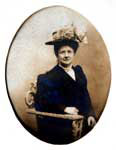
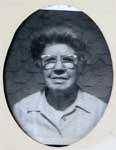

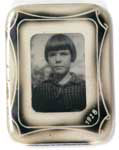
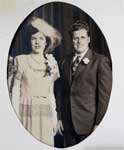
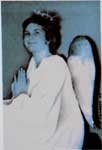
 |
 |
 |
 |
 |
 |
|
Tea Leaves: a memoir of mothers and daughters was inspired by those pictured above (left to right) my great grandmother Martha Washington Gadsby, my grandmother Ethelind Elizabeth Gadsby (later Wood and then Bell) and my mother (Sarah) Jane Mason, and my father, Albert Mason.
|
Tea Leaves: a memoir of mothers and daughters is multi-layered and has a backdrop in the U.S. labor movement. The narrator's grandmother was a spinner in a textile factory, the mother an office worker, and the narrator, the first to be graduated from college, tells their story as well as her own. Note: This is chapter 6 fromTea Leaves. To read other sections click here. Violin Lessons "Sympathy pains." My mother examines me, owl-like,
shrewd intensity. My words waver with dread. I still cannot accept the
fact that my mother is terminally ill. Despite the depth of my denial,
I frequently burst into tears. Two and a half months have passed since
my mother’s diagnosis, nearly half of the time that the doctor said
she had left. This afternoon, shortly after I arrived to find my father in the kitchen using the pressure cooker to make brown rice, my mother decided to eat sitting down in the living room. She said that sitting up to the table made her back hurt, but I suspect that she also has been feeling too weak to move around much. My father and I sat at the dining room silently eating—except for an occasional failed effort on my part to make conversation. My mother was only about ten feet away in the living room, and even with my back to her we could have included her in a conversation. The fact of her absence, however, was too depressing. This is how it would be after she was gone. My father and I, the two of us sitting alone, an enormous silence between us.
As my mother shifts in her chair, trying to get comfortable,
anguish flashes across her face. I feel a stabbing pain in my own left
shoulder. Bright hot tears rise in my eyes. I look away from her, unable
to witness an agony so strong I feel it in my own body. of my pain down.” As my mother tells me this, she enters another dimension. It is as if she really has entered this room that she points to, somewhere behind the furrowed brow of her forehead. I tell her this is good, and it is. She has learned to use visualization to lessen the painful invasion that is taking over her body. Still, there is something odd about this—my mother receding to an actual place that exists only in her mind. The semi conversation my mother and I were having about sympathy pains—hers for her mother and mine for my mother—has taken on the proportions of a lead balloon. There are no words to discuss the possibility of losing someone you never thought would die. As I sit on the sofa staring out the front window, watching the light of the afternoon sun turn into shadows, I feel my mother scrutinizing my face. As long as I am my mother’s daughter—for the rest of my life—I will never outgrow the fact that I came out of her body. Just as I sometimes study my mother’s face, seeing no trace of myself and wondering who she is, she does the same thing to me. I must be just as much of a mystery, the stranger she gave birth to. "Why did you want to play the harp?" she asks, when I have turned my gaze from the window to look back at her. Starting in kindergarten and through the third grade, I attended an Episcopal private school. The girls all wore blue and white jumpers, the boys suits and ties. We learned French, went to chapel in the morning, and in the afternoon at recess showed each other our bare asses in the bushes. When I was in first grade, my mother enrolled me in violin lessons with the school’s music teacher. "Remember when you took me to see the Suzuki violin
players?" I laugh. The fact is that this is basically all I remember
from the entire performance. "Yeah. He fell off his chair twice.
The second time was when he turned to the kid next to him to tell him
how he fell off the chair, then he did it all over again." "I'll bet the conductor was ready to kill him," she says. I shrug. "What did they expect? They might have been great violin players, but they were still kids." After my mother had signed me up for lessons, she took me to the city to talk to an old man who was a well-known violin teacher. He showed me his collection of violins, had me sing the notes of the scale, and asked me what instrument I wanted to play. I looked into the smiling lines of his creased face and said, "The harp. I want to play the harp." "Why did you want to play the harp and not the violin?" my mother asks me now, thirty years later. I am quiet for a moment. "I guess playing the violin wasn't really my idea,"
I say cautiously. "I liked the harp My mother is quiet. I feel slightly guilty for telling her the truth. Playing the violin may have been her idea, but it was something she wanted for me. The child-size violin she bought and then sold a few years later was expensive. But it was worth it to my mother. She wanted me to have a well-rounded education, to experience the things that poverty denied her as a child. I may have cried my way through ear-shattering violin practice sessions, but the fact is that these lessons instilled a deep appreciation of music in me. I love the violin concertos, in particular Mozart, Tchaikovsky, Vivaldi, and especially, Mendelssohn. I learned the musical scale and to read and write music. A few years after the failed violin lessons I was playing Beethoven's Ninth Symphony by ear on the xylophone. Those early violin lessons also gave me my first glimpse of myself as a girl who loved another girl, as a girl who would grow into a woman who loved other women. As I sit quietly musing about my own past, I look over and see from the far away look on my mother’s wizened face that she too is thinking back and putting together the puzzle pieces of her life. My mother has always had a habit of doing this, of bringing up something that happened in her childhood as if it had happened yesterday. But now, at nearly the half way mark of the time that she has left, my mother is beginning to retreat into the past more often. In telling me her stories, my mother is going back to a time before the cancer invaded her body. The past is preferable to the present. "My mother always wanted me to work in an office,"
says my mother. "She always said that no daughter of hers was going
to work in the mill. She wanted me to work in an office. So I I'd tell her. 'Cows are content, not people.' She was right. Nothing was ever good enough for me. But she taught me that." "Mama always said 'art doesn't put food on the table.' " My mother is talking softly and shaking her head as she repeats her mother’s words that I have heard so often over the years. My mother has never been resentful when she told me this. Being an artist was not a realistic possibility for a poor girl whose mother worked in the mill. This fact was repeated to me about my own life in various ways throughout my childhood and adolescence--most memorably when I spent too much time on my silk-screens in high school, and later when I wanted to major in fine art photography in college. "The only one who understood me was my father." My mother looks out the window far into the distance as she speaks. One night when I was in my early twenties, not long after
I moved away, the two of us were sitting in the living room watching a
movie on the television about a young woman whose father was dying. My
mother broke down, gasping between sobs. "At least she knew her father
died," she said. "I never knew what happened to my father. I
don't know if he's dead or alive." My mother launches into another story, one that I have heard so often that I can see the country house of her childhood. A year before my mother was born, my grandmother and her husband when they were first married moved to Bucks County, an area not more than an hour from the city. At the time is was a rural area, though by now it is part of the suburban sprawl that spreads from the shopping mall built across from the residential hills. Route One now cuts the landscape in two. When I was a child, my mother used to drive me through her old neighborhood and point out the house where she had lived. The house was small, but in my mother’s imagination and in the stories she passed on to me, it was larger than life. The front room of the white painted wooden house was converted into a country store. Its shelves were lined with canned goods, bags of grain, and glass jars full of candy that my mother and her sister were not allowed to touch. Though when my mother was older, about seven, she did manage to sneak some soda pop and cigarettes out of the store to share with her gang of friends who all ended up sick. Behind the store was the family room—like the rest of the house it had an unfinished wood floor—with a braided rug in the middle of its sparse furnishings. “I used to sit in front of that rug for hours just tracing its coiled patterns with my eyes. After Peggy, the Airedale, had given birth to seven puppies, I took my stick of charcoal and drew a big picture of her on the living room wall. There she was, larger than life on the white wall, stretched out on her side with seven scrawny puppies suckling on her teats.” "I had just finished the drawing when my mother
came in the room. She was so angry that her face
was as white as the wall. I thought she was going to kill me. Instead
she went and got my father. 'Look what she did,' my mother said to him,
'Speak to that child.' My father looked at my drawing for a long time
and then he said to me, 'Jane, that's a very good drawing.' " "I always remember the story about putting the blue
chalk in the chicken's water," I say to her after I am settled back
down on the sofa, and have put our cups on the coasters on the end "When I brought the water up it as blue as the sky.
My mother was busy in the store. She was always dusting or waiting on
the customers or taking care of the baby. And my father was off somewhere,
probably in town drinking. I was happy to be on my own. The wildflowers
kept me company--the Queen Anne's Lace, the Chicory Root with the pale
blue flowers that The chickens were my friends—Chickadee and Blue,
and their baby chicks. Those baby chicks were just little fluff balls
the size of my fists. Every time I tried to pick them up they ran away." I stare down into my cup, turning it between my palms.
The leaves that broke loose from the tea bag swirl into the broken spiral
of my mother’s childhood. As I begin to understand the terror under
her words, I see her father blocking the light, casting a shadow across
his skinny six- It was all her fault. "I made their water pretty, that's all. I gave them
pretty water to drink." He picked up the bowls and slammed them down on the ground.
Shards of clay stuck like daggers in the dirt. The blue water, absorbed,
turned to mud.Her father's face red as the comb
on the rooster’s head. In my childhood, my mother's stories ended before the
strap lashes into her child body, before her father's red faced anger
lashed into her, leaving welts, binding her dreams no matter which way
she turned. But now as we sit facing each other, my mother takes the story
further. Still, her father's violence didn't stop her from dreaming. And in her dreams, she soared. I grew up hearing about the catwalk her father had built around the outside of their house. “My father never did finish it, but I climbed up on it anyway. One day I stood on the roof and spread my arms like a bird. Then my mother came out of the house. She looked up and screamed at me to get down. I was so startled that I damned near fell off the roof. “My mother called my father and told him to speak to me. He came out of the house and yelled up at me: 'Hello there, Jane, you'd better come down before you scare the life out of your mother.' After the way she yelled at me, I was scaring her? I walked to the back of the house where the catwalk slanted all the way to the ground, sat down, put my hands behind me, pushed, and slid all the way to the ground." “Weren’t you afraid?” I raise my eyebrows
and look at my mother. It wasn't her father’s beatings that broke her.
It was his leaving, this point of excavation, that became the dividing
line of her life, her before and after. She never speaks of when he left. A few years ago my mother gave me a small hand held mirror with a photograph of her framed on the back. The mirror is no more than two inches high and an inch across. In the border of the photograph, the number 1928 is printed in white against a black background. It was taken when she was eight years old. Every now and then I take it out, hold it in my hand, and turn it over to see how my reflection compares to her picture. Our hair is different. Hers at eight was bowl-cut, bangs straight across dropping down in a round dome just below her ears. I’ve had my share of bad haircuts, especially in my teens when I let my best friend cut it. But now in my mid thirties I am happy with it. It’s short and styled with points at the ears. In my twenties I used to spike my hair. And even though I haven’t touched the mousse tube in years, there are times—especially when I’ve slept on it wet—that it stands straight up. I once thought my mother and I looked nothing alike. But as I approach mid-life and see the signs of my mother slipping away from me, I reconsider. Maybe my face is growing into itself, reflecting more of who I am. Perhaps it is simply a matter of perspective. I have the same full lips that solemnly turn down at the edges, the same wary eyes that my mother had when she was eight. The lines of my mother's childhood grief have etched themselves onto my face. Fortunately, neither of our expressions are static. Both
of our facial expressions are fluid as our emotions run the gamut from
outbursts of laughter to quick summations of anger. But this My humming had musical scores. My violin lessons led me into a wholly encompassing, exhilarating and deeply riveting attraction to another violin student which can only be called a crush due to the fact that I was in first grade. Marcie was in fifth grade and a much better violinist than I. She was the student before me, and when I peered through the tall double wooden doors into the music room and saw the intensity of her dark eyes, the distinct tilt of her chin, and the arc of her arm as she held the bow, my heart thudded all the way down to the soles of my saddle shoes. I had what my mother called a boyfriend in first grade
also. Jimmy used to chase me around the room and try to kiss me. I always
got away, but eventually consented to let him button my coat after he
promised to show me his six toes on one foot. The fact that two of his
I wrote in heavy letters on the cover of my phonics notebook with a number two pencil: I LOVE MARCIE. Too late, I realized what I had done and tried in vain to erase my letters. I rubbed my green notebook cover to white with my pink eraser but the incriminating words could still be read. "What does that say?" my mother asked when she saw the notebook. I don’t recall that my mother was angry, but her strained curiosity caused a pounding in my veins. "Lassie," I said. "I love Lassie." It was 1964. Fear and hatred of people who loved the same sex was in the air I breathed and the water I drank. Already, in first grade, I knew that it wasn't even safe to tell my own mother than I loved another girl, no matter how wonderful she was. There were other signs over the years. Once, a stab of recognition curled my toes in my blue Keds when I met the eyes of another girl in the lobby of a restaurant where I went with my parents. I was a pre-teen by then and there was something about this girl, something dark and forbidden, that made me recognize that she was like me. I also had strong emotional attachments to my girlfriends. But for the most part, I managed to block this forbidden love out of my psyche. The omens of love that were available to me then, the hearts and rings, the promises of “I shalt” and “I do” were inadequate to prepare me for being a lesbian, a woman who owned the province of her own sexuality. As an adolescent I hated myself without knowing why. Alcoholism was a genetic trait passed down to me from both sides of my family. My father didn't drink but his brothers did. His younger brother died of a heart attack by the time he was forty. My mother told me that he drank and danced himself to death. This story--complete with the knife that he slept with under his pillow after coming home from the front lines of WWII--met my childhood ears as a kind of adventure. Soon I was able to fill my own life with the same kind of danger and excitement gleaned from alcohol and drugs. My first drink, when I was fourteen, slid easily into
the next and I was transported out of my body. I drank to escape myself.
I drank so my life could be endured. I drank my way through junior high,
high school, and college. As a young woman, I drank my way through two
long-term relationships with men and more short-term involvements than
I care to remember. I Almost. There are no neat and tidy endings for an alcoholic--even for one who has stopped drinking. There are the sledgehammer memories of a person who was me but under the influence wasn't really me at all. Worse, there is the absence of memory. Slices of my life have been blacked out and will never be returned. Years later I still have a sense of erosion, as if something vital and irreplaceable was stripped from me. Every now and then my own denial creeps in, as if by saying that it never happened I could actually erase those years of my life and go back and do it over. I wonder what would have happened if it had been possible for me to foretell my own future when I was an adolescent. Chances are that I wouldn't have wanted to know. Caught in the vice grip of adolescent peer pressure, I most likely wouldn't have wanted to become who I grew into. Yet, there's very little about my life that I would change, even if I could. The fact is that I am happy. When I was twenty-four--the same age at which my mother met my father--I fell in love with Barbara. Like most people in long-term relationships we've had our rough patches. But through it all she's remained the love of my life, my safe harbor. My mother is sitting quietly, a whimsical expression on her face as she stares out the front window at the lengthening shadows. Deep from the bottom of my vocal chords, below that even, a small vibration starts. It becomes slightly louder, almost audible and then crests through the line of my pursed lips. I am humming, ever so slightly and almost unconsciously. I am humming the melody of my childhood and the dissonant chords of my adolescence. I am humming from the belly of the woman I have become. I am humming now as I have always been humming. With my mother's help, I have hummed myself into existence.
|